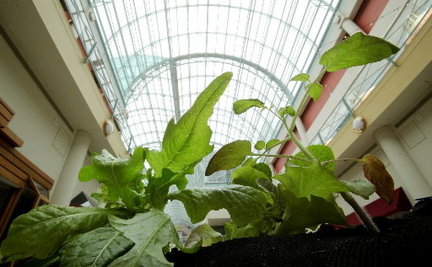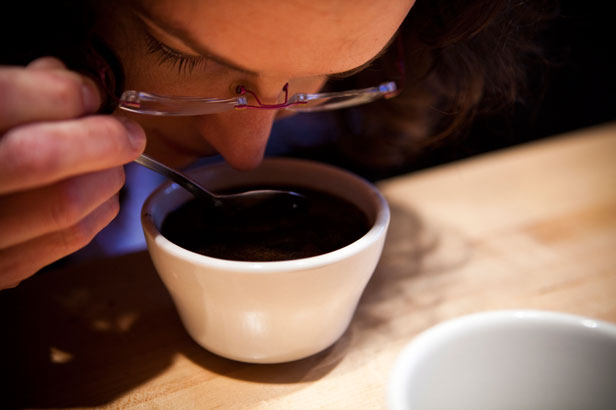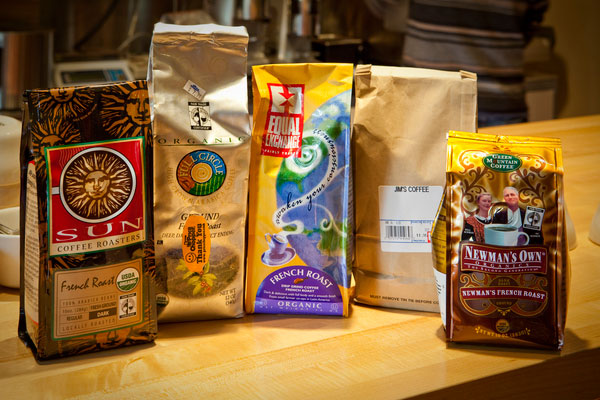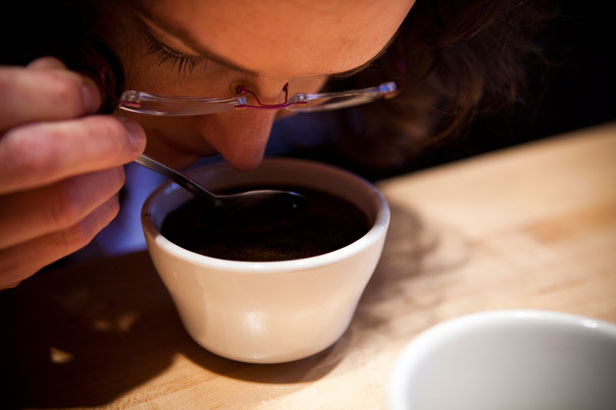 Photos: Jason Houston
Photos: Jason Houston
To say that I love coffee is a big, fat lie. I need coffee in a chemically dependent way. Its effect upon me is essentially the reverse of those faces-of-meth photos.
There are two things that can really screw up a good coffee buzz (OK, three if you count skim milk). First is the fact that conventionally grown coffee is an environmental bummer. To quote Umbra Fisk, “Conventional coffee production involves chemicals, deforestation, and mistreated workers and dead birds.”
So to avoid songbird blood on your hands first thing in the morning, buy coffee with organic, fair trade, and shade-grown certifications. (Super-extra bonus points for triple-cert!) You’ll pay a premium for this coffee, but it’s worth it.
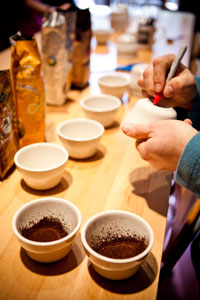 But just because a coffee is principled doesn’t mean it tastes heavenly. The second thing that can ruin a good cup of coffee? Bad taste. I don’t know about you, but bad coffee makes me feel like this. In order to spare you such an experience (AHHAIAHH! So many coffees! Why is there no good coffee? I want good coffee!), I assembled a panel of four other coffee lovers and headed to my neighborhood roaster, Barrington Coffee. There, founders Barth Anderson and Gregg Charbonneau hosted — but, in the interests of strict neutrality, did not participate in — my tasting in their chic “cupping room.”
But just because a coffee is principled doesn’t mean it tastes heavenly. The second thing that can ruin a good cup of coffee? Bad taste. I don’t know about you, but bad coffee makes me feel like this. In order to spare you such an experience (AHHAIAHH! So many coffees! Why is there no good coffee? I want good coffee!), I assembled a panel of four other coffee lovers and headed to my neighborhood roaster, Barrington Coffee. There, founders Barth Anderson and Gregg Charbonneau hosted — but, in the interests of strict neutrality, did not participate in — my tasting in their chic “cupping room.”
This blind tasting provided a “sensorial analysis” of five organic French roasts. Under Gregg and Barth’s careful tutelage, we evaluated the dry grounds for appearance and aroma. Then, after hot water was poured over each, we waited two minutes and then noted an aromatic impression at “crust break” — you break up surface grounds with spoon and sniff “dangerously close.” Next, Gregg skimmed the floating grounds, and we tasted by aspirating a spoonful over the palate: a procedure that allows grownups to make the very fun, loud slurping sound we’re always telling our kids to stop making. Lastly, we let the coffee cool down and tasted it again. (More slurping.)
And now, the results …
Full Circle French Roast
Price: $7.49 per pound
Eco cred: USDA Organic and Fair Trade certified. A portion of every sale is donated to Coffee Kids.
Feedback: Despite the slogan for Price Chopper’s in-store brand of French roast — “Deep, Dark, A Perfect Ending” — this joe was described as “mellow” by one taster and “thin” by a few. One said it was like “truck stop coffee that’s been sitting for an hour.” (Had this taster, who was stylishly dressed and sporting pearl earrings, ever been to a truck stop? We’ll never know.) One comment could be have been construed as both praise or criticism: “It’s like Starbucks.” Kindest comment: “I could almost drink this without cream.”
Jim’s Organic Coffee French Roast
Price: $11.95 per pound, purchased in bulk
Eco cred: Certified Organic by Quality Assurance International.
Feedback: The Web marketing copy describes this coffee as “Big, full flavor with slightly carbonized taste.” OK, I know “carbonized” means scorched, but the Internet also defines it as a “Swedish avant garde death metal band.” I like “Swedish death metal band taste” much better!
One taster particularly liked the chocolaty smell of this coffee, which he also described as “winy.” Unfortunately, no one liked the taste. “It’s sweet but not a good sweet” scowled one lady, while another noted its “synthetic flavor.” If you like your French roasts real smoky, this coffee might be the one for you. One taster, struggling for words, sipped and mused, “If you take a flip-flop and put it in the fire … ” The damning comments continued: “Reminds me of robusta!” — straight to a coffee snob’s heart. And, even worse: “Like instant.”
Newman’s Own Organics French Roast
Price: $7.99 for 10 oz
Eco cred: This coffee is sourced and roasted by Green Mountain Coffee, a Vermont roaster with a corporate ethic that includes fighting climate change, which is good because some coffee growers are going to get hosed by it. It is also USDA & QAI Organic and Fair Trade certified; while it’s not certified bird friendly, it “typically is grown under a shade canopy,” emailed a spokesperson.
Feedback: It seems wrong to speak critically of the dead, especially when the late Mr. Newman has given $250 million to charities worldwide. But technically, only the dead’s coffee got dissed badly. The kindest comment for this java — billed as “a dignified dark roast with a passionate French undercurrent” — came at the cool-down: “It gets worse with time, but this one would be OK by me.” Disparate comments: “sourish” … “funny tongue-feel” … “dirty.” The most damning comment was from a cranky taster who skipped her morning coffee in order to participate in the tasting: “I wouldn’t even drink this after a hangover. It’s bitter and shitty.”
Sun Coffee Roasters Organic French Roast
Price: $5.99 per 10 oz (on sale! regularly $7.49)
Eco cred: USDA Organic, Fair Trade certified, and Bird Friendly, which is good considering that the term “sun coffee” means coffee that is the opposite of shade-grown. For those of us in southwestern Massachusetts, this is regional coffee roasted in nearby Connecticut, 55 miles away.
Feedback: “It has chocolate in the nose! I’d drink it!” exclaimed one participant, who said this coffee was the “richest.” The cranky taster (see “shitty” comment, above) said, “It’s the only one I’d drink.” Another said, “Nice chocolaty flavor.” But its noirish-ness may have been too much for one detractor, who said it “desperately needs cream.”
Equal Exchange
Price: $9.19 per 10 oz
Eco cred: Organic certification by Oregon Tilth and Fair Trade certified. Not shade grown, but Web FAQ says the company is “currently exploring the range of options for shade-grown certification that are now available to us.”
Feedback: This coffee, according to a wine-loving taster, “had more structure.” Another concurred that it had “some depth.” More than one panelist described it as “rich,” and its smell offended no one. Cranky lady pronounced it “ashy.” Strangest comment of the day: “Skunky smell, but in a really good way!”
The bottom line
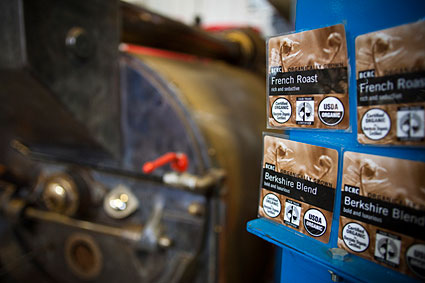 After the tasting the above coffees, we tried Barrington Coffee’s in-house organic French roast, which had been roasted the prior day. The results were quite shocking: The panel unanimously found it to be delicious.
After the tasting the above coffees, we tried Barrington Coffee’s in-house organic French roast, which had been roasted the prior day. The results were quite shocking: The panel unanimously found it to be delicious.
And it wasn’t because Barth and Gregg were our gracious hosts. (Trust me — this group had Tourette’s-like honesty.) This fresh stuff was straight-to-your-brainstem yummy: smooth, rich, chocolaty.
The point worth remembering here is that coffee is perishable; freshly roasted stuff is best. So, if you are able and lucky, find yourself a small, local roaster. The coffee will not only be fresher, but your direct relationship with them will allow to you ask questions to determine whether or not its production is sustainable. Some smaller roasters such as Barrington may source their beans from small growers who lack certifications, but whose practices are nonetheless praiseworthy.
Short of that, reach for Equal Exchange, which our panel ranked the highest. (Although, strangely enough, the comments toward Sun were kinder. So, gas up your morning tank with that one, too.) And despite the grumpiness of this panel, it should be noted that the ranked coffees were more alike than different — so much so that one taster gave up and essentially dropped out of the tasting, declaring “I can’t make heads or tails of any of these, and I’m wearing gay* coffee shoes.”
But really, no matter what your taste, you’re off to great start by choosing environmentally principled coffee.
*This comment was in no way meant to offend the gay community. Trust me; I pinkie-swear that this particular Massachusetts panel fully supports gay marriage. And while we’re at it, we’re all really sorry about Scott Brown. And apropos of nothing but the spirit of fending off potentially pissy comments: This tasting was vegan. We didn’t oppress a cow by taking her cream.
